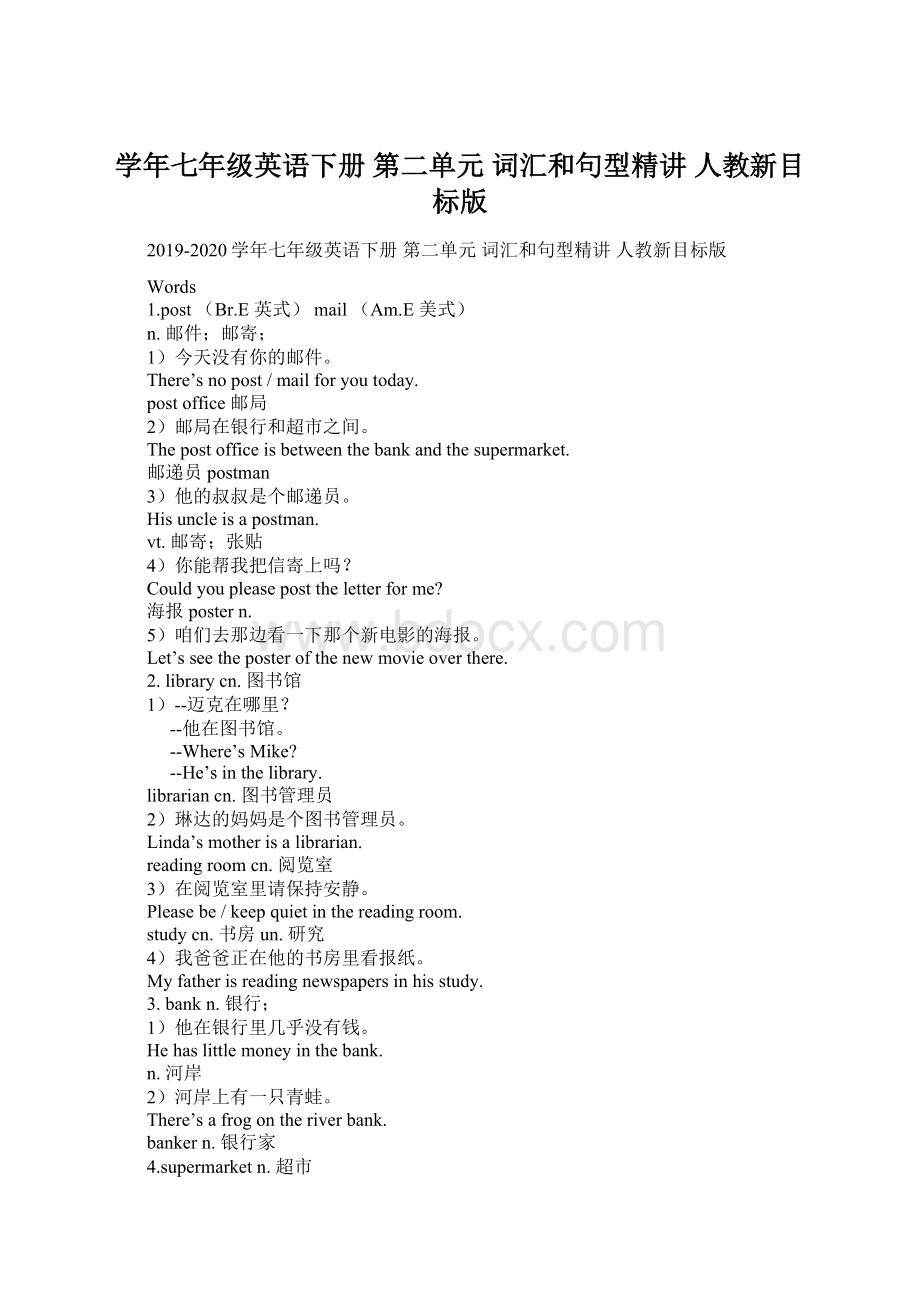学年七年级英语下册 第二单元 词汇和句型精讲 人教新目标版.docx
《学年七年级英语下册 第二单元 词汇和句型精讲 人教新目标版.docx》由会员分享,可在线阅读,更多相关《学年七年级英语下册 第二单元 词汇和句型精讲 人教新目标版.docx(10页珍藏版)》请在冰豆网上搜索。

学年七年级英语下册第二单元词汇和句型精讲人教新目标版
2019-2020学年七年级英语下册第二单元词汇和句型精讲人教新目标版
Words
1.post(Br.E英式)mail(Am.E美式)
n.邮件;邮寄;
1)今天没有你的邮件。
There’snopost/mailforyoutoday.
postoffice邮局
2)邮局在银行和超市之间。
Thepostofficeisbetweenthebankandthesupermarket.
邮递员postman
3)他的叔叔是个邮递员。
Hisuncleisapostman.
vt.邮寄;张贴
4)你能帮我把信寄上吗?
Couldyoupleaseposttheletterforme?
海报postern.
5)咱们去那边看一下那个新电影的海报。
Let’sseetheposterofthenewmovieoverthere.
2.librarycn.图书馆
1)--迈克在哪里?
--他在图书馆。
--Where’sMike?
--He’sinthelibrary.
librariancn.图书管理员
2)琳达的妈妈是个图书管理员。
Linda’smotherisalibrarian.
readingroomcn.阅览室
3)在阅览室里请保持安静。
Pleasebe/keepquietinthereadingroom.
studycn.书房un.研究
4)我爸爸正在他的书房里看报纸。
Myfatherisreadingnewspapersinhisstudy.
3.bankn.银行;
1)他在银行里几乎没有钱。
Hehaslittlemoneyinthebank.
n.河岸
2)河岸上有一只青蛙。
There’safrogontheriverbank.
bankern.银行家
4.supermarketn.超市
1)--在这附近有超市吗?
---有。
/没有。
--Isthereasupermarketnearhere?
--Yes,thereis./No,thereisn’t.
superadj.超级的
2)我认为姚明是个超级篮球明星。
IthinkYaoMingisasuperbasketballstar.
supermann.超人
3)你想成为超人吗?
Doyouwanttobeasuperman?
marketn.市场
4)你在市场上可以买到各种各样的新鲜蔬菜。
Youcanbuyallkindsoffreshvegetablesinthemarket.
5.payn.薪水
1)同工同酬。
Equalpayforequalwork.
vt.付钱买…pay…forsth.
2)我花了80元买这本字典。
Ipaid80yuanforthedictionary.
3)这双鞋你花了多少钱?
Howmuchdidyoupayfortheshoes?
paythebill结帐paythegasbill交煤气费
4)饭后谁来结帐?
Whowillpaythebillafterdinner?
6.parkn.公园
1)我们经常去公园散步。
Weoftentake/goforawalkinthepark.
vt.停车
2)不要把车停在这里。
把它停在(地上)停车场。
Don’tparkyourcarhere.Parkitintheparkinglot.
7.turnvi.转身
1)他转身走了。
Heturnedandwalkedaway.
2)沿着路走,在第二个路口向右拐。
Walkdownthestreetandturnrightatthesecondcrossing.
n.轮流;依次
It’sone’sturntodosth.轮到某人做某事
3)轮到你擦黑板了。
It’syourturntocleantheblackboard.
taketurnstodosth.轮流做某事
4)这对双胞胎姐妹轮流照顾生病住院的母亲。
Thetwinsisterstaketurnstolookaftertheirmotherinhospital.
8.rightn.权利
1)你有选举权吗?
Doyouhavetherighttovote?
n.右边
2)我可以看到在我的右边有一家超市。
Icanseeasupermarketonmyright.
n.正确
3)你能辨别是非吗?
Canyoutellrightfromwrong?
adj.正确的
4)谁能给我正确答案?
Whocangivemetherightanswer?
adj.右边的
5)你的右手里有什么?
What’sinyourrighthand?
9.openvt.打开(表动作)
1)打开门让新鲜空气进来。
Openthedoorandletfreshairin.
adj.开门营业的,开着的(表状态)
2)那家商店从上午九点到下午六点营业。
Thestoreisopenfrom9a.m.to6p.m..
3)不要关门。
请让它开着。
Don’tclosethedoor.Pleasekeepitopen.
4)我太困了,眼睛都睁不开了。
Iamtoosleepytokeepmyeyesopen.
10.cleanvt.(扫、擦等)干净
1)让我帮你打扫教室吧!
Letmehelpyou(to)cleantheclassroom.
cleanup彻底清扫
2)我们每周都要彻底清扫校园。
Wecleanupourschoolcampuseveryweek.
cleanout彻底清理(内部);
3)妈妈经常让我清理一下冰箱。
Mymotheroftenasksmetocleanoutthefridge/refrigerator.
adj.干净的
4)我们的教室干净又明亮。
Ourclassroomiscleanandbright.(表语)
5)生物需要干净的水和空气。
Livingthingsneedcleanwaterandair.(定语)
6)我们必须保持教室的清洁。
Wemustkeepourclassroomclean.(宾补)
adj.无不良/违章记录的
7)爸爸没有违章驾驶纪录。
Myfatherhasacleandrivinglicence.(英式)
Myfatherhasacleandriver’slicense.(美式)
11.enjoyvt.喜欢,后接n./代词/doing
1)你喜欢这部电影吗?
Doyouenjoythemovie?
2)他们在这次聚会上玩得很开心。
Theyenjoyedthemselvesattheparty.
3)那位老人喜欢饭后在公园里散步。
Theoldmanenjoystakingawalkintheparkaftermeals.
mind,finish,practice+doingsth.
介意/完成/练习做某事(也有此种用法)
12.tourn.观光
1)你喜欢这次在北京的观光吗?
Doyouenjoy/likethetourinBeijing?
2)她的叔叔是一个导游。
Heruncleisatourguide.
touristn.游客
3)在寒假海南有很多观光客。
TherearemanytouristsinHainanduringthewintervacation.
touristyadj.拥挤的,游客多的
tourismn.旅游业
13.visitvt.参观,访问;
1)这些来访者想参观故宫。
ThevisitorswanttovisitthePalaceMuseum.
vt.看望
2)你多长时间去看望祖父母一次?
Howoftendoyouvisityourgrandparents?
visitorn.参观者,访问者
3)每年秋天长城会有很多游客。
TherearemanyvisitorstotheGreatWallinautumn.
14.Ifconj.如果(引导条件状语从句:
主将从现)
1)如果明天天气好,我们就去公园散步。
Ifitisfinetomorrow,wewilltakeawalkinthepark.
conj.(引导宾语从句)是否=whether
2)我不知道明天他是否能按时来。
Idon’tknowifhewillbehereontimetomorrow.
15.arrivevi.到达arrive+adv.
arrivein+大地方//arriveat+小地方
1)我通常放学后6点到家。
Iusuallyarrivehomeat5o’clockafterschool.
2)他们几点到达北京?
WhattimewilltheyarriveinBeijing?
3)最后,我们按时到达了那个小村庄。
Finally,wearrivedatthesmallvillageontime.
getto+n.//get+adv.到达
4)老师经常告诉我们按时到校。
Theteacheroftentellsustogettoschoolontime.
5)我爸爸每天六点到家。
Myfathergetshomeat6intheafternoon.
reachvt.到达
6)信是昨天到的。
Theletterreachedmeyesterday.
作“到达”讲时,区别:
当不加到达的地点时,只用arrive。
7)飞机已经到了吗?
Hastheplanearrived?
8)你能告诉我明天客人们几点到?
Canyoutellmewhattimethevisitorswillarrivetomorrow?
16.funnyadj.滑稽的,可笑的
1)他经常给我们讲滑稽故事。
Heoftentellsusfunnystories.
2)那个样子可笑的人是谁?
Whoisthefunny-lookingman?
funun.好玩,乐趣
3)孩子们经常在水里玩的很开心。
Kidsoftenhavefunplayinginwater.
课本知识讲解
1.There’sabankonCenterStreet.(P7--1c)
在中央大街有一家银行。
“Therebe句型”注意以下几点:
当表达没有生命的物或地方“有”…时,会用此句型。
此句型为倒装句,“Therebe”句型中的系动词be的单复数有“就近原则”,即be的单复数和靠近它的主语一致。
1)桌子上有两支钢笔和一本书。
Thereisabookandtwopensonthedesk.=Therearetwopensandabookonthedesk.
Therebe句型的否定形式为:
在be动词后加not。
2)那个书包里没有铅笔盒。
Thereisn’tapencilcaseinthebackpack.
3)公园里没有很多人。
Therearen’tmanypeopleinthepark.
Therebe的疑问句为:
将be动词提前。
4)---在他的房前有一棵大树吗?
---是的,有。
---Isthereatalltreeinfrontofhishouse?
---Yes,thereis.
5)---公园里有花吗?
---不,没有。
---Arethereanyflowersinthepark?
---No,therearen’t.
在此疑问句型中,单数可数名词前常用a,复数名词前常用any。
因为therebe就是谓语“有”。
请注意以下用法:
6)操场上有一些男生踢足球。
Therearesomeboysplayingsoccerontheplayground.
(一定不要用play。
playing为play的现在分词形式,因为表达孩子踢球,所以用现在分词playing表示主动)。
7)没时间了。
(剩下的时间不多了)
Thereisnotimeleft.
(此句中的left为leave的过去分词形式,因为表达时间是被剩下,所以用过去分词left表示被动)。
2.Thepayphoneisacrossfromthelibrary.
投币式电话在图书馆对过。
(P8--2a)
当一个句子中没有行为动词“做什么”,我们常常会使用be动词,也称系动词,它与其后面的介词短语构成“系表结构”作谓语,所以这种句子中只有“主系表”,即“主谓结构”的句子。
例如:
1)超市在邮局附近。
Thesupermarketisnexttothepostoffice.
acrossfrom…=acrossthestreetfrom…
在(马路)对面
以上这种表示“方位”的句子中,句中所出现的名词前一般要出现定冠词“the”表示特指。
3.Thelibraryisbetweentherestaurantandthesupermarket.(P8--2b)
图书馆在餐馆和超市之间。
between介词,“在…和…之间(两个)”。
1)那只猫正坐在简和奶奶之间。
ThecatissittingbetweenJaneandhergrandmother.
among介词,“在…中间(很多)”。
2)老师正坐在学生们中间。
Theteacherissittingamongthestudents.
4.Excuseme.Isthereahotelintheneighborhood?
(P9--3a)
打扰一下,请问这附近有宾馆吗?
1)劳驾,你能告诉我最近的超市怎么走?
Excuseme.Canyoutellmehowtogettothenearestsupermarket?
2)我家附近有一些商店。
Therearesomestoresinmyneighborhood.
sorry与excuseme的区别:
3)我听到此事感到很难过。
I’msorrytohearthat.
5.Welcometothegardendistrict.
欢迎来到花园地区。
(P11--3a)
Welcometosth/todosth…欢迎….
1)欢迎来到我们学校。
Welcometoourschool.
2)欢迎你随时使用我的电脑。
You’rewelcometousemycomputeratanytimeyoulike.
6.TakeawalkthroughtheparkonCenterAvenue.在中央大道旁的公园里散步。
(P11--3a)
takeawalk=haveawalk散步
1)你想沿着公路散散步吗?
Wouldyouliketotakeawalkalongthestreet?
through介词,穿过(尤指从里面)
past介词,经过(旁边),across介词,横穿
2)一条河流经这座城市。
Ariverrunsthroughthecity.
3)我每天上班都从公园旁边经过。
Iwalkpasttheparkeverydayonmywaytowork.
4)不要横穿马路。
Don’tgoacrossthestreet.
7.Acrossfromtheparkisanoldhotel.
在公园对过是一家年久的旅馆。
(P11--3a)
倒装句:
为了表示上下句的衔接紧凑;有时主语太长,为避免“头重脚轻”。
1)门开了,老师进来了。
Thedooropenedandincametheteacher.
2)Nexttothehotelisasmallhousewithaninterestinggarden.(P11--3a)
在旅馆旁边是一个小房子,小房子还带有一个很有趣的花园。
8.Thisisthebeginningofthegardentour.
这就是公园游览的开始。
(P11--3a)
1)这就是我们假期的开始。
ThisisthebeginningofourVacation.
atthebeginningof…在……开始
2)在会议开始,我们唱了一首歌。
Atthebeginningofthemeeting,wesangasong.
3)在路的开始处,你可以看到一家宾馆。
You’llfindahotelatthebeginningoftheroad.
其反义词组:
attheendof…..在……末(端)
9.BridgeStreetisagoodplacetohavefun.Bridge大街是一个娱乐玩耍的好地方。
(P11--3b)
1)这是一个就餐的好地方。
Thisisagoodrestauranttohavedinner.
2)香港是个购物的好地方。
HongKongisagoodplacetogoshopping.
3)我有话要说。
Ihavesomethingtosay.
4)他没有房子住。
Hehasnoroomtolivein.
10.It’sthere,betweentherestaurantandthepostoffice.(P11--3b)
它在那边,在餐馆和邮局之间。
betweentherestaurantandthepostoffice为介词短语,是there的同位语,进
一步解释there指“那里”的确切位置。
1)史密斯先生,我们的英语老师,他来自美国。
Mr.Smith,ourEnglishteacher,isfromAmerica.
11.Andifyou’rehungry,youcanbuysomefoodinthesupermarket.(P11--3b)
如果你饿了,你可以在超市买些吃的。
if“如果”引导的是一个条件状语从句。
1)如果你有话要说,请举手。
Ifyouhavesomethingtosay,pleaseputupyourhand.
注意:
如果表示将来的时态时,在if引导的条件状语从句中,要用一般时表将来。
2)如果明天不下雨,我们会去野餐。
Ifitdoesn’traintomorrow,wewillhaveapicnic.
12.IknowyouarearrivingnextSunday.我知道你下周日来。
(P12--3)
复合句,youarearrivingnextSunday是一个宾语从句。
在英语中,come,go,leave,arrive,die的进行时,经常用来表示将来。
1)我们下周离开。
Weareleavingnextweek.
2)那个病人快不行了。
Thepatientisdying.
13.Letmetellyouthewaytomyhouse.让我告诉你无我家的路。
(P12--3)
letsbdosth.“让某人做某事”
1)让我来帮你复习功课。
Letmehelpyouwithyourhomework.
thewayto…“去…的路”,其中的to为介词。
2)你能告诉我去银行的路吗?
Canyoutellmethewaytothebank?
3)这个孩子知道回家的路吗?
Doesthechildknowthewayhome?
14.Whenyouseeabigsupermarket,turnleft.当你看到一家大超市时,向左拐。
(P12--3)
复合句,含有